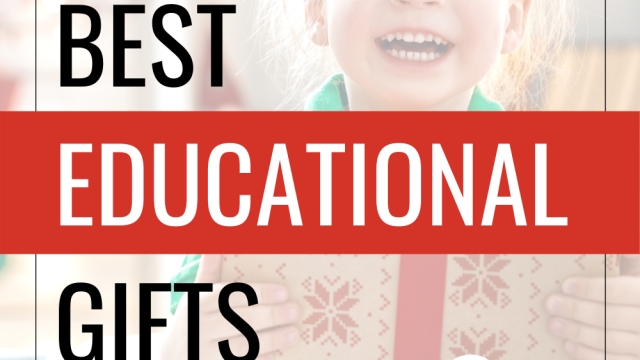In a world where knowledge is the key to success, finding the perfect educational gift for children can be a rewarding experience. Whether you’re a parent, grandparent, or a caring friend, giving the gift of learning not only sparks curiosity but also opens doors to limitless possibilities. Educational gifts have the power to inspire young minds, encourage their natural enthusiasm for exploration, and provide them with the tools they need to thrive academically. From learning tools that engage little ones in interactive play to stimulating activities designed for preschool-aged children, this ultimate guide is here to help you unlock a world of educational possibilities. So, let’s embark on a journey together and explore the wonders of educational gifts that will leave a lasting impact on the young minds of today and the leaders of tomorrow.

Educational Gifts For Kids
1. Educational Gifts for Kids
When it comes to finding the perfect educational gifts for kids, there are so many options to choose from. These gifts not only bring joy but also provide opportunities for learning and growth. From interactive toys to engaging games, educational gifts are a wonderful way to inspire curiosity and encourage a love for learning in children.
One great option is learning tools for kids that focus on different subjects such as science, math, or language. These tools can be anything from fun kits that allow children to conduct their own experiments, to puzzles and games that make learning math concepts enjoyable. By incorporating hands-on activities and interactive features, these educational tools make learning an engaging and enjoyable experience for kids.
For preschoolers, learning activities that help develop their cognitive and motor skills are particularly beneficial. These activities can include building blocks to enhance coordination, memory games to exercise their brains, and educational apps that introduce basic concepts. Educational gifts for this age group play a crucial role in laying the foundation for future learning by stimulating their curiosity and fostering essential skills.
In conclusion, when looking for educational gifts for kids, it’s important to consider their age, interests, and developmental needs. By choosing gifts that combine fun and learning, we can unlock their potential and provide them with the tools they need to thrive academically and beyond. So why not give the gift of knowledge and ignite a lifelong love for learning in the young minds of our children?
2. Learning Tools for Kids
When it comes to educational gifts for kids, learning tools play a vital role in making the learning process fun and interactive. These tools not only enhance a child’s cognitive development but also foster creativity and critical thinking skills. Here are some fantastic learning tools that can make a difference:
Interactive Science Kits: Science kits provide hands-on exploration opportunities for young minds. With experiments and activities tailored to their age group, kids can learn about various scientific concepts while having a blast. From making volcanoes erupt to growing crystals, these kits bring science to life in a captivating way.
Building Blocks and Construction Sets: Building blocks and construction sets are not only enjoyable but also promote problem-solving and spatial reasoning skills. These toys allow kids to unleash their imagination and create structures of their own. Whether it’s building a towering skyscraper or a simple house, these tools encourage creativity and fine motor skills.
Puzzle Games: Puzzle games are a great way to challenge young minds and encourage logical thinking. From jigsaw puzzles to brain teasers, these games improve problem-solving abilities and enhance cognitive skills. Additionally, they promote patience and perseverance as kids work to solve the puzzles.
By incorporating these learning tools into their playtime, children can learn and grow in engaging ways. These educational gifts provide a solid foundation for their future academic and personal development, making learning an enjoyable and enriching experience for young learners.
This concludes section 2 of our ultimate guide to educational gifts. Stay tuned for the next section, where we will explore exciting learning activities for preschoolers.
3. Learning Activities for Preschoolers
Interactive Toys: Interactive toys are a wonderful way to engage young minds and promote early learning. There are a wide variety of educational toys available that encourage exploration, problem-solving, and creativity. Look for toys that incorporate colors, shapes, numbers, and letters, as well as those that promote fine motor skills and hand-eye coordination. Interactive toys like building blocks, puzzles, and shape sorters can help preschoolers develop important cognitive and motor skills while having fun.
Arts and Crafts: Allowing preschoolers to express their creativity through arts and crafts can be both educational and enjoyable. Provide them with age-appropriate art supplies such as crayons, washable markers, colored pencils, and safety scissors. Encourage them to draw, paint, and create using different materials like paper, cardboard, and clay. Engaging in arts and crafts activities enhances fine motor skills, hand-eye coordination, and imagination. It also fosters self-expression and boosts self-confidence in young learners.
Sensory Play: Preschoolers love exploring the world around them through their senses. Sensory play activities can be a fantastic way to promote their cognitive and emotional development. Create sensory bins filled with various materials like colored rice, sand, water beads, or kinetic sand. Add different objects or toys to enhance the sensory experience and encourage discovery. Playdough or slime making can also be engaging activities that stimulate touch and strengthen fine motor skills. Sensory play not only ignites curiosity but also helps children to develop their language, social, and problem-solving skills.
Remember to always supervise children during activities and choose age-appropriate materials to ensure their safety while they learn and have fun. These learning activities for preschoolers provide a solid foundation for further educational development and can help ignite a lifelong love for learning.
